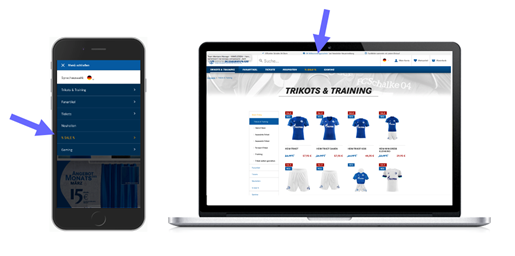
Maximizing fan engagement and digital revenues for sports teams with personalization and experimentation
Sports teams are now some of the biggest brands in the world, with tens (and sometimes hundreds) of millions of global fans, all passionately supporting their team. Showing the scale of these businesses Forbes ranks the Dallas Cowboys as the most valuable sports team in the world, with a net worth of $5 billion. Deloitte calculates that the 20 highest earning football clubs in the world generated a record $10.44 billion (€9.3 billion) of combined revenue in the 2018/19 season, up 11% on the previous year. Personalization is key to boosting your fan engagement and revenues.
1 The global digital opportunity for sports teams
Whereas before fans could only follow their local club, the internet now removes barriers of geography to make it possible for people to support and engage with their team, wherever they are in the world.
While they can’t impact the results on the pitch, the websites of sports brands are therefore crucial, needing to act as the brand authority and a fan destination. The site provides a sense of community as well as match day experiences, the owned TV channel, corporate hospitality/boxes, stadium seating, merchandise and services. It enables brands to showcase their main sponsors and therefore deepen and increase the value of these partnerships.
Your stadium capacity is limited but digital acts as the main point of contact for people, breaking down geographic barriers and developing the experience with your fans, helping make you their favorite sports brand.
Demonstrating this, over 10% of club revenues often come from retail sales, much of which is now online. Websites and apps also enable clubs to showcase their partners, leveraging engagement with high web traffic a key part of successfully increasing revenues from sponsors in the digital age.
2 The challenges of serving a global audience of sports fans
Meeting a wide range of consumer expectations
Operating globally brings the same challenges for sports teams as for any other international brand or retailer. Sports fans are:
- Speak multiple languages
- Are not all interested in the same products
- Have differing levels of knowledge and support for their club
- Climate-wise are in different seasons, with a corresponding impact on the clothes and other products they want to buy
- Use their own currencies
- Have different shipping requirements
The impact of the pandemic on sports businesses
Add to this that during the current pandemic many sporting fixtures have been either postponed or are being played without fans in the stadium due to health concerns. This wipes out a large slice of previously secure match day revenues, such as hospitality and tickets, which in the case of many leading football clubs can be over $2 million per match.
Digital can help replace these lost revenues however, as fan engagement will spike and clubs can use these match day peaks to assess opportunities to monetize or strengthen loyalty through content and services unique to the club and its brand.
3 How personalization and experimentation helps sports teams
The power of personalization and experimentation
At Kameleoon we work with a number of leading global football clubs to help them maximize their digital presence. They use our personalization and A/B testing platform to engage more closely with fans, deliver a tailored experience and consequently increase revenues that can then be spent on the pitch. Our public clients include clubs in the top European leagues, including FC Schalke 04 in Germany, which is using Kameleoon on its online store for fan merchandise.

German football club Schalke 04’s personalization and experimentation strategy aims to optimize its online store by analysing visitor behavior and using this information to improve the individual experience for fans. It runs A/B tests to validate ideas and hypotheses before rolling them out on the online shop.
Schalke’s overall objectives are to increase conversions in terms of orders and cart size as well as to grow newsletter registrations and help push seasonal promotions, such as around sales and the introduction of new kits.
One example of where it has seen large-scale benefits is from changing the color of the navigation link to its Sale page. After testing this, switching to an orange navigation element saw 20% more users click on the link, with orders rising by 5.77% - growing overall revenues.

Based on the experience of our consultants, working with football clubs and other sports brands, we see six major benefits for personalization and experimentation:
1. Greater fan engagement with teams
With fans coming from around the world, their interests and knowledge will vary widely. They will have particular favorite players and other preferences. Analyzing their behavior enables sports brands to use this information to better understand their interests and to deliver a personalized experience, with different messages, images and banners. This increases engagement, strengthening the relationship between fan and club and ensuring they keep returning to the site.
2. Delivering a tailored experience to each fan or site visitor segment
Being able to segment audiences by location, language and other factors enables sports teams to automatically tailor the website to specific needs.
Understanding your site visitors interests and intent through personalization helps you deliver an experience they’ll want. For example, if a journey is focused on gifting for a new or infrequent visitor, that is unlikely to be a fan, the focus could include recommendations and upsell. So international visitors only see products that are available in their location, with clear shipping options and prices in their local currency. This segmented approach can then be further refined using techniques such as AI-based personalization, which deliver one-to-one personalization based on the behavior and propensity score of individual visitors.
3. Impact against your KPIs and improved results plus revenues
The e-commerce operations of sports brands needs to deliver the same values as the club. Every retail website visitor wants a seamless experience that makes it easy to find what they are looking for. This can be difficult matching the affinity of your visitor to content on the site, from favorite players’ unique club content, TV, memberships and retail sales. Understanding the intent of each fan enables the club to signpost the most relevant journeys, offers and content, with personalization thus helping increase your success and potentially retail sales.
4. The ability to experiment
A global fanbase has different needs and expectations, meaning that the experience that works for one country or group may not be relevant to another. A/B testing enables sports teams to continually test and improve the experience through experimentation, analyzing the results to see which changes, promotions and new features appeal to which audiences. Brands can therefore continually ensure they meet the needs of fans, wherever they are around the world.
5. Selling new services
In the fast-moving world of sport, brands need to come up with new services that will appeal to their fans and support revenue growth. Whether it is online subscriptions to premium content, new levels of membership or access to streaming TV packages, these can be tested with specific audiences before being rolled out more generally. They can also be used as part of cross-sell and upsell opportunities to further increase revenues.
6. Increasing basket sizes
With a wide range of transactional services across the site, from hospitality, to seats and the product catalog, sports brands want to maximize cross-sell and upsell opportunities. Recognizing visitors who are potentially interested in additional content, services or products enables sports brands to offer incentives to increase basket size. For example, fans that reach a certain criteria could receive free or discounted club membership or points that can be used towards specified incentives.
Through personalisation we can re-create a better match experience based on the individual club affinity, geo-location and many more factors. Learnings from the global audience and in engaging fans with a physical/language barrier has opened doors to better engage and personalise the online experience for fans during the pandemic.
Sports brands are in a unique position. Not only do their websites offer the chance to bring together millions of fans from around the world into a single community, but they create a destination that is frequently accessed and a vital shop window to promote the expanding range of products and services that brands offer. Only by embracing personalization and A/B testing can they ensure that they successfully deliver the right experience to every fan, wherever they are in the world, increasing engagement, brand authority and revenues.





